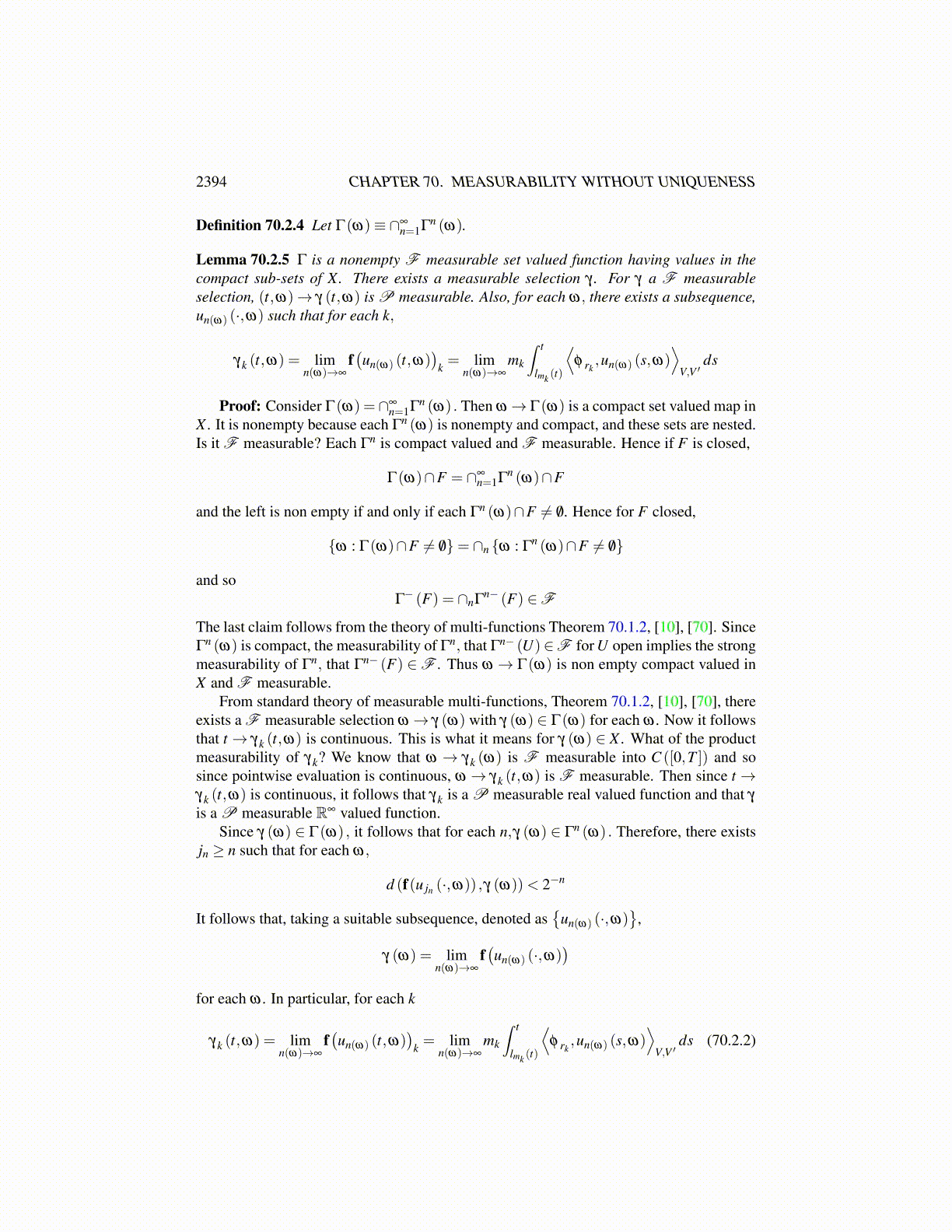
2394 CHAPTER 70. MEASURABILITY WITHOUT UNIQUENESS
as follows
ψm,φ u(t)≡∫ T
0
⟨mφX[lm(t),t] (s) ,u(s)
⟩V,V ′ ds = m
∫ t
lm(t)⟨φ ,u(s)⟩V,V ′ ds.
Let D = {φ r}∞
r=1 denote a countable dense subset of V . Then the pairs (φ ,m) for φ ∈ D
and m ∈ N yield a countable set. Let(
mk,φ rk
)denote an enumeration of these pairs
(m,φ) ∈ N×D . To save notation, we denote
fk (u)(t)≡ ψmk,φ rk(u)(t) = mk
∫ t
lmk (t)
⟨φ rk
,u(s)⟩
V,V ′ds
For fixed ω /∈ N and k, the functions{
t→ fk (u j (·,ω))(t)}
j are uniformly boundedand equicontinuous because they are in C0,1 ([0,T ]). Indeed,
∣∣ fk (u j (·,ω))(t)∣∣= ∣∣∣∣∣mk
∫ t
lmk (t)
⟨φ rk
,u j (s,ω)⟩
V,V ′ds
∣∣∣∣∣≤C (ω)∥∥∥φ rk
∥∥∥V,
and for t ≤ t ′ ∣∣ fk (u j (·,ω))(t)− fk (u j (·,ω))(t ′)∣∣
≤
∣∣∣∣∣mk
∫ t
lmk (t)
⟨φ rk
,u j (s,ω)⟩
V,V ′ds−mk
∫ t ′
lmk (t′)
⟨φ rk
,u j (s,ω)⟩
V,V ′ds
∣∣∣∣∣≤ 2mk
∣∣t ′− t∣∣∥∥∥φ rk
∥∥∥V ′
C (ω) .
By Lemma 70.2.2, the set of functions{
f(u j (·,ω))}∞
j=n is pre-compact in the space definedas X = ∏k C ([0,T ]) . Then define a set valued map Γn : Ω→ X as follows.
Γn (ω)≡ ∪ j≥n
{f(u j (·,ω))
},
where the closure is taken in X . Then Γn (ω) is the closure of a pre-compact set in∏k C ([0,T ]) and so Γn (ω) is compact in ∏k C ([0,T ]) . From the definition, a function fis in Γn (ω) if and only if d (f, f(wl))→ 0 as l→ ∞, where each wl is one of the u j (·,ω)for j ≥ n. From the topology on X this happens if and only if for every k,
fk (t) = liml→∞
mk
∫ t
lmk (t)
⟨φ rk
,wl (s,ω)⟩
V,V ′ds,
where the limit is the uniform limit in t.Note that in the case of a filtration, instead of a single σ -algebra F where each u j is
progressively measurable, if the sequence wl does not have the index l dependent on ω, thenif such a limit holds for each ω, it follows that (t,ω)→ fk (t,ω) will inherit progressivemeasurability from the wl . This situation will be typical when dealing with stochasticequations with path uniqueness known. Thus this is a reasonable way to attempt to considermeasurability and the more difficult question of whether a process is adapted.